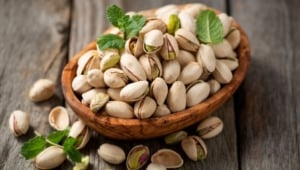8 Health Benefits of Almonds & 4 Risks

Almonds have a long history of cultivation in Asia. They were introduced to the Western world in the 1500s, and have since become an integral part of food. In this article, we’ll delve into the top benefits you’ll get from adding almonds to your diet, plus how to use them in delicious recipes.
Almonds are actually seeds which contain a huge amount of nutrients. They’re full of amazing health benefits for your mind and body. They can help keep your blood sugar from spiking, improve your bone health, and nourish your skin.
Interesting Facts about Almonds

Interesting Facts about Almonds
There are plenty of interesting facts when it comes to this special little superfood. As noted above, almonds are actually not nuts, but seeds. They’re related to peaches, can be turned into almond milk, and can be made into flour.
Almond trees are stunning, and look very similar to popular cherry trees in the Spring, with their pale pink blooms. They’re so beautiful that Greek mythology tells the story of a queen who was turned into an almond tree by the gods.
Origin and Where Almonds Grow

Origin and Where Almonds Grow
Almonds were most likely first grown in Asia, somewhere in the Western regions as well as parts of China and the Middle East. They were first cultivated as long ago as 3000 to 2000 BCE.
Nowadays, California produces most of America’s almonds, as well as 80 percent of the world’s supply.
The state grows 100 percent of the commercial almond supply of the US.
When Are Almonds in Season?

When Are Almonds in Season?
Regular almonds are generally ready to be picked around the beginning of August, while green almonds may be harvested between April and June.
Green almonds are essentially just unripe regular almonds, though some like to use them for salad toppings, chutney, or sprinkled with some good quality sea salt.
Nutritional Facts, Calories and Protein of Almonds

Nutritional Facts, Calories and Protein of Almonds
Almonds will nourish your body with vitamin A, B vitamins, vitamin C, vitamin D, vitamin E, copper, calcium, riboflavin, magnesium, potassium, iron, niacin, folate, thiamin, sulfur, chlorine, phosphorus, sodium, and zinc.
They contain 8 essential amino acids and a high level of antioxidants, chiefly in the form of tocopherol present in vitamin E.
1 oz contains approximately 165 calories, so almonds are a calorie-dense food. However, as you can see they also contain plenty of beneficial (mostly monounsaturated) fats, fiber, protein, and other healthy nutrients.
Health Benefits of Eating Almonds: Why It Is So Good for You

Health Benefits of Eating Almonds: Why It Is So Good for You
Almonds are a true superfood with many health benefits for your body and mind. They’re easy to add to most diets. Just see our list of almond health benefits below, then head onto our potential risk section to see if almonds are right for you.
May Enhance Sexual Performance and Arousal

May Enhance Sexual Performance and Arousal
Almonds are full of amino acids, including arginine. Arginine is known for improving blood flow and increasing sexual performance in men.
The increase in blood flow may also help with arousal in both men and women, making almonds a great choice if you’re looking to boost your libido.
Can Contribute to Better Bone Health
Almonds have a high protein, magnesium, and calcium content. All of these are important nutrients for keeping your bones healthy.
They’re also especially helpful when it comes to keeping your growing baby or babies healthy if you are expecting. This makes almonds an excellent pregnancy snack.
Help Curb Spikes in Blood Sugar Levels

Help Curb Spikes in Blood Sugar Levels
There has been some research on almonds which has proven that they may help reduce rising blood sugar levels. They can also curb a rise in insulin levels, particularly following meals.
This is really helpful if you’re diabetic. Add about 1 oz of almonds to your daily diet, but make sure you stick to ones that do not contain any added salt or sugar.
Loaded with Antioxidants and Beneficial Nutrients

Loaded with Antioxidants and Beneficial Nutrients
Almonds are full of beneficial nutrients and antioxidants. Antioxidants fight free radicals in our cells, warding off illnesses and keeping cells healthy.
This in turn helps keep your body from developing cancerous cells.
Healthy cells are less likely to develop cancer, so adding antioxidants to your diet is vital.
Beneficial for a Variety of Ailments Including Alzheimers

Beneficial for a Variety of Ailments Including Alzheimers
Almonds help keep your brain healthy, and can even reduce how fast it declines with age.
Foods with antioxidant and anti-inflammatory properties, such as almonds, are beneficial for your body as well as your mind.
It’s been suggested that the monounsaturated fats in almonds are to blame, as these can lower inflammation markers in your body.
May Help Lower Blood Pressure Levels and Cholesterol
Some of the compounds in almonds appear to improve the dilation of your body’s blood vessels. This in turn helps lower blood pressure.
Almonds have been proven to help with the lowering of systolic blood pressure. This is great news, particularly if you’re looking to lower slightly elevated blood pressure naturally.
May Aid with Weight Loss

May Aid with Weight Loss
Almonds, much like other nuts and seeds, help promote a feeling of fullness. This can make it easier to stick to a calorie-restrictive diet and keep you from snacking on other, unhealthier foods.
Several meta-analyses and clinical trials were evaluated and found that only almonds helped with the overall reduction of fat mass and body weight.
This is despite the fact that almonds are calorie-dense. In short, if you’re looking to lose weight, you’ll want to include almonds in your diet.
Can Lower Your Risk of Heart Disease

Can Lower Your Risk of Heart Disease
Adding almonds to your diet may reduce your risk of developing heart disease. This is largely because some of the compounds in almonds help lower levels of oxidized LDL cholesterol.
There is a call for larger studies on humans, but the results look promising. If you’re wanting to add heart-protective foods to your diet, almonds are a great place to start.
Potential Risks of Almonds

Potential Risks of Almonds
Any health food carries some risks as well as benefits. Almonds are no exception here. Many of these are down to overconsumption, so moderation is key. Below are the top possible side effects that may come with eating almonds.
May Cause an Allergic Reaction
If you are allergic to other seeds and nuts, you may potentially need to exercise caution when it comes to almonds. Almonds can cause skin irritation amongst other allergic reactions. Some allergies are severe.
Could Cause Some Digestive Problems

Could Cause Some Digestive Problems
Excess consumption of almonds may cause severe itching, gas, bloating, vomiting, difficulty to swallow, and diarrhea. With that said, you’d need to eat quite a lot of almonds to cause problems.
May Interact with Some Types of Medication
Some blood pressure medication may adversely interact with almonds. Almonds can lower systolic blood pressure, so having too many alongside blood pressure medication may have unwanted side effects.
Could Cause Weight Gain

Could Cause Weight Gain
Almonds are a high-calorie food. If you consume too many, they may actually cause weight gain. Adding a small amount of almonds to your diet, however, can help you feel full for longer. This in turn may help with weight loss.
Are Almonds in Pregnancy Good For You?

Are Almonds in Pregnancy Good For You?
Almonds, much like other seeds and nuts, are excellent for a healthy pregnancy diet. Add them on their own or mix them into a seed and nut snack mix. You could also make healthy granola bars using your favorite recipes.
Almonds contain magnesium, calcium, and protein, all of which are great for strengthening your baby’s teeth and bones.
Almonds also help control your blood sugar and blood pressure levels, regulate insulin, and stimulate your enzyme function, which can prevent poor fetal growth and preeclampsia.
They’re great for any trimester and will nourish your and your baby’s bodies with plenty of goodness. Almonds contain a huge amount of nutrients, protein, fiber, and healthy fats, so they’re a resounding ‘yes’ when it comes to your pregnancy diet.
Can Dogs and Cats Eat Almonds?

Can Dogs and Cats Eat Almonds?
No. Your furry friends can’t really digest almonds.
Eating one or two won’t cause them lasting harm, but too many may lead to gas, diarrhea, vomiting, lethargy, and a loss in appetite.
They’re also a choking hazard, particularly for cats and small dogs. So keep almonds away from your furry companions. Instead, keep them for yourself and your own healthy diet.
Delicious Recipe Ideas with Almonds

Delicious Recipe Ideas with Almonds
Almonds make for a tasty snack on their own, though they’re even better when added to various recipes. From yummy almond milk lattes to roasted snacks, here are our top recipe ideas to make with almonds.
Almond Milk Latte

Almond Milk Latte
Almond milk lattes are quick and easy to make. Just substitute dairy milk in your favorite latte recipe. You can even froth almond milk with a whisk or steam wand, for that creamy latte texture you love. Almond milk is particularly rich in magnesium and vitamin E.
Homemade Marzipan

Homemade Marzipan
Homemade marzipan is one of the easiest, tastiest treats you can make. It is full of sugar, but the almond content makes for a sweet snack that is also very filling. You can use homemade marzipan on its own or in Christmas baking.
Candied Almonds
Candied almonds are a wonderful Christmas market treat. If you’re making them at home, you’ll want to watch your sugar like a hawk, as it can easily burn. Sugar syrup also tends to get much hotter than water on its own, so make sure you don’t hurt yourself while making these.
DIY Almond Butter

DIY Almond Butter
All you need to make homemade almond butter is raw almonds and a bit of salt. You can also add some honey, maple syrup, vanilla extract, or a touch of cinnamon, but you don’t have to.
To make it, you’ll need to roast the almonds, then allow them to cool to just warm and blend them in a food processor. That’s it. The end result is a lot like peanut butter and very good for you.
Roasted Almonds with Rosemary
You can roast almonds with just about anything. Rosemary offers a huge amount of health benefits, including antimicrobial, antioxidant, and anti-inflammatory properties. It also smells and tastes wonderful. Try different variations with herbs, salt, pepper, and spices of your choice.
Tips for Using Almonds

Tips for Using Almonds
As with other nuts and seeds, almonds need a little bit of TLC when it comes to storage. Here we’ll tell you just how to keep them fresh the longest, as well as how you can make more of almonds — including growing your own.
How to Store Almonds

How to Store Almonds
Almonds are best stored in a cool and dry pantry or refrigerator. Always keep them in airtight containers, and avoid exposing almonds to sunlight or moisture.
Fresh almonds may be stored for at least 2 years. Roasted almonds will stay fresh for around a year when placed in an airtight container.
Make Your Own Almond Milk

Make Your Own Almond Milk
Almond milk is surprisingly easy to make – all you need is a few ingredients and 10 minutes of your time. You’ll want around a cup of raw almonds, 5 cups of water, and a pinch of sea salt.
The recipe we found suggested adding some vanilla extract or dates to sweeten it, but this is optional. Pre-soak the almonds, then add them to a blender with the other ingredients.
Strain the liquid using a ‘nut milk bag’ or cheesecloth, and transfer to a jar or bottle. The almond milk will stay fresh for up to 4 to 5 days, just shake it well before drinking it.
Grow an Almond Tree in Your Garden

Grow an Almond Tree in Your Garden
Almond trees grow well in the sun, and just need a spot that’s sheltered from cold winds. They need well-drained and fertile soil.
These trees grow the best in USDA growing zones 5 to 9, with later-blooming types not needing the warmest temperatures, but generally also yielding less seeds. Almond trees are frequently grown for their beautiful flowers, too.
- Tomato Juice. Health Benefits + Tips.
- Asparagus. Benefits for Your Health.
- Mango. Benefits and Side Effects.
- Onions. Health Benefits and Tips for Use.
- Spinach. Benefits and Exctiting Facts.
- Peanuts. Health Benefits & Tips and Hacks.
- Dark Chocolate. Health Benefits and Tips.





